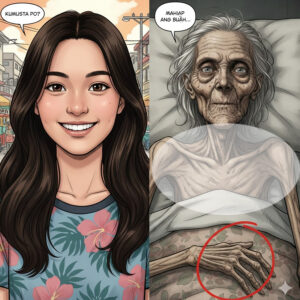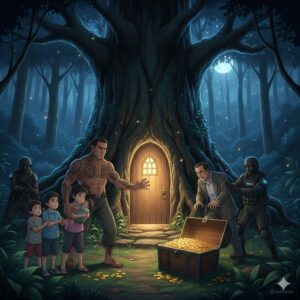THE PREGNANT WOMAN WHO ATE GRASS — HER HUSBAND NEVER KNEW WHY UNTIL THE DELIVERY DAY
Episode 1
It started as a joke. Everyone in the neighborhood laughed when they heard that Moyo, a pregnant woman of eight months, had developed a strange craving for grass. Yes—real green grass. At first, her husband Tunde thought it was one of those pregnancy cravings women get—like eating charcoal or licking sand—but this was different. Moyo didn’t just crave grass; she devoured it like a starving goat. Every morning, she would sit in the backyard with a large bowl of freshly cut grass, her colorful wrapper barely covering her huge belly, and eat it with a strange hunger that frightened even the birds.
Tunde tried to stop her countless times. “Moyo! You’re embarrassing me!” he shouted one afternoon as he found her chewing a handful of grass while humming softly to herself. “People are talking! What will the neighbors say?” But she only looked up at him with wide eyes and said, “I can’t help it, Tunde. The baby… the baby won’t let me rest until I eat.” Her voice shook, and there was fear in her tone—not madness, not foolishness—fear.
That night, Tunde couldn’t sleep. He sat by the edge of their bed watching his wife toss and turn, her hands clutching her belly as if something inside was moving violently. “It’s hungry again,” she whispered in the dark. “It wants me to feed it.” He tried to calm her, saying it was just a dream, but when he reached to touch her stomach, something strange happened—something moved beneath her skin, not like a normal baby’s kick but a long, slithering motion, like the crawl of a snake.
Tunde jumped back, his heart pounding. “Moyo, what was that?” She turned to him slowly, tears streaming down her face. “I told you,” she whispered, “something inside me is not normal.”
The next morning, things got worse. Moyo woke up early, went outside, and started eating grass again—but this time, not the soft kind. She pulled out wild, bitter weeds from the corners of the fence, the ones even goats avoided. Tunde ran after her, panicking. “Moyo, stop! Please!” He grabbed her hands, but she fought him with strength he’d never seen in her before. Her eyes looked strange—glassy, distant, almost glowing.
Later that day, when he finally managed to get her to the hospital, the doctor ran tests but found nothing unusual. “Her vitals are normal,” he said. “Just a psychological craving. It’s harmless.” But as they left the hospital, an old janitor cleaning the corridor pulled Tunde aside and whispered, “Take her to a church, my son. This is not medicine. It’s spiritual.”
That night, Tunde found his wife sitting on the veranda again, her eyes fixed on the moon, a bowl of fresh green grass in her hands. “It’s calling me again,” she said softly. “It says it’s not ready to come out yet. It still needs to eat.”
Tunde stared at her in disbelief, his mind spinning. “What’s calling you?” he asked, his voice trembling. She turned to him slowly, her pupils dilated, and whispered, “Our child.”
He wanted to laugh, to believe it was madness—but deep down, something told him she wasn’t lying. Because when she smiled, he saw it clearly—the faint outline of something long and coiled pressing against her stomach from the inside.
And that was the night he realized—his wife wasn’t just carrying a baby. She was carrying something else.
THE PREGNANT WOMAN WHO ATE GRASS — HER HUSBAND NEVER KNEW WHY UNTIL THE DELIVERY DAY
Episode 2
Tunde didn’t know what was worse — the rumors flying around the neighborhood or his wife’s sudden obsession with grass. By now, everyone knew. Aunties, neighbors, even the okada riders by the junction whispered, “That’s the man whose wife eats grass.” It had gotten so bad that people came to peep through their fence like it was a reality show. One day, Tunde even caught two women hiding behind the wall recording Moyo on their phones while she chewed happily under the morning sun. He nearly lost his mind. “My wife is not a cow!” he shouted, chasing them away with a mop. “Go and film your own problems!” But as he turned back, there was Moyo again — sitting gracefully on her chair, smiling like a queen, and saying, “Honey, can you get me some grass with dew? It tastes sweeter in the morning.”
That was the breaking point. Tunde called his mother in the village. “Mama, please, your daughter-in-law has gone mad,” he cried. But Mama, being a typical village mother, only asked, “Which kind of grass is she eating? Maybe it’s herbal.” “Mama! It’s grass! Ordinary green grass! She chews it like rice!” “Hmm,” Mama sighed. “Then maybe she is carrying a special child. You know, when I was pregnant with you, I used to eat chalk and soap.” “Mama, that was soap, not shrub!”
But the funniest part came the next morning. Tunde tried to trick her. He replaced her bowl of grass with lettuce from the market, thinking she wouldn’t notice. Moyo took one bite, spat it out dramatically, and said, “This grass is fake! Did you buy this from Lagos?” Tunde blinked. “How can grass be fake?” She glared at him like a queen scolding a servant. “My baby doesn’t like market grass. He wants grass that grows from prayer and sunlight!” Tunde nearly fainted.
Still, something about her changed. She began talking to her belly more, whispering softly at night. Sometimes, Tunde would wake up to hear her laughing alone in the dark, saying, “Stop tickling me!” He would sit up, terrified. “Moyo, who are you talking to?” She’d smile sleepily. “Our baby. He’s funny.” “Funny?” Tunde muttered, “Madness runs in the family.”
But one night, something happened that turned his laughter into fear. Moyo was asleep, snoring softly, when Tunde heard a rustling sound. At first, he thought it was the wind. Then he saw it — long, thin marks moving under her skin, like something crawling from one side of her belly to the other. Her body jerked, and suddenly, she started laughing in her sleep — not her normal laughter, but a deep, echoing one that made his blood run cold. “It’s growing,” she murmured. “It’s hungry.”
Terrified, Tunde ran to his pastor the next morning. The pastor listened carefully, then said, “Bring her to church. But first, stop feeding the grass. The spirit feeds through it.” Tunde nodded, relieved. That night, he decided to throw away all the grass. But when he got home, he found Moyo guarding it like treasure. “Don’t touch my food!” she shouted. “If you throw it away, he will be angry!” “Who will be angry?” Tunde yelled. She paused, eyes wide and distant. “Your father.”
Tunde froze. “My… what?” His father had died ten years ago. “Moyo, stop joking.” But she only smiled eerily and said, “He visits me sometimes. He says you don’t listen to him anymore.”
That night, Tunde didn’t sleep. He sat in the corner, watching her rock back and forth, humming an old song his late father used to sing. When she saw him staring, she smiled gently and said, “Don’t worry, Tunde. After the baby comes, everything will make sense.”
He wanted to believe her. He wanted to think this was just pregnancy madness. But deep down, something told him that the woman sitting before him wasn’t entirely his wife anymore.
And what happened the next morning confirmed it — because when he woke up, the bowl of grass was gone. Instead, there were footprints on the lawn outside — small, muddy, and shaped like snake scales.
THE PREGNANT WOMAN WHO ATE GRASS — HER HUSBAND NEVER KNEW WHY UNTIL THE DELIVERY DAY
Episode 3
That night, the wind howled strangely around the house, rattling the windows like something wanted in. Tunde lay awake, pretending to sleep, his heart pounding so hard he could hear it echo in his ears. For three nights straight, he had been hearing things — footsteps, whispers, and once, the sound of the backyard gate creaking open at exactly 2:00 a.m. Every time he tried to follow, Moyo would suddenly appear beside him, smiling like she hadn’t moved at all. But tonight felt different. There was a chill in the air, the kind that carried warnings. He waited until she turned in bed, then heard her mumble something under her breath. Slowly, silently, she sat up, her hair falling over her face, and began to walk toward the door.
Tunde followed carefully, his bare feet silent on the floor. The air felt heavier as he stepped into the corridor. She opened the back door and stepped into the moonlight. And that’s when he saw it — his wife, in her wrapper, kneeling in the middle of the garden, whispering into the bowl of grass like it was alive. The moonlight reflected on something shiny near her — a small clay pot decorated with cowrie shells and red cloth. Then she did something that made him almost scream — she pulled a strand of her hair, dropped it into the pot, and began humming a song in a language he didn’t recognize.
“Moyo!” he called out before he could stop himself.
She froze. Then, slowly, she turned her head — not her body, just her head — in a way no human neck should turn. Her eyes glowed faintly green. “You shouldn’t be here, Tunde,” she whispered, her voice layered, like two people were speaking through her. “He doesn’t like to be watched when he feeds.”
Tunde stumbled backward, terrified. “Who is he?” he stammered.
She smiled, then pointed at her swollen belly. “Our baby,” she said softly. “He’s not like other children. He’s been feeding on grass because he’s half from here…” she touched her chest, “…and half from the earth below.”
Tunde didn’t understand what she meant, but before he could say another word, the clay pot began to move — on its own. It rolled slowly toward him, then stopped and cracked open with a sharp pop. A small puff of green smoke rose into the air, carrying a foul smell. Tunde’s legs gave way as he fell backward. Moyo, however, smiled dreamily. “He’s happy,” she whispered. “He’s full now.”
The next morning, Tunde rushed to Pastor Femi’s house with tears in his eyes. The old man listened quietly, then went to his shelf and took out a small Bible and a bottle of anointing oil. “Bring her tonight,” he said. “Whatever is growing in her womb is not a child from God.”
But convincing Moyo to go wasn’t easy. She was calm at first, even playful, saying, “Why do we need prayers, Tunde? I’m just pregnant.” But that night, as he was dressing up, she stood in the doorway, her expression cold and distant. “You want to take me to the pastor?” she asked. “To chase away my baby?”
“No,” Tunde said softly. “To pray for our family.”
She smiled faintly. “Our family doesn’t need prayer. It needs loyalty.” Then she stepped closer, placed her hand on his cheek, and whispered, “If you ever try to harm him, I will make you eat the same grass you hate so much.”
Tunde froze. Her touch felt ice-cold, her breath warm and sharp like smoke.
By midnight, she was gone. He searched everywhere — the backyard, the road, even the neighbors’ compound. Then he saw her — far away near the stream, standing under a tree, surrounded by faint lights like fireflies. Except they weren’t fireflies — they were eyes. Dozens of glowing eyes circling her as she held her belly and chanted. Tunde’s blood ran cold. He hid behind a tree, his heart hammering. “He’s coming,” she said to the shadows. “The chosen one who will bring back the earth mother.”
Suddenly, the ground shook slightly, and the stream bubbled as if something underneath was waking up. Tunde couldn’t take it anymore. He screamed, “Moyo! Stop this madness!” She turned around sharply, her eyes blazing. “You shouldn’t have come here!” she shouted, and just then, something moved in the water — a massive dark shape, slithering, rising, coiling behind her.
He ran. He didn’t look back until he reached home, panting, shaking, covered in sweat. He locked the doors and waited till dawn. When she finally returned, she was calm again — barefoot, her wrapper soaked, her face pale. She smiled weakly and said, “Don’t worry, Tunde. Soon, everything will make sense. Our baby will explain it all.”
And for the first time, Tunde looked at her belly — really looked — and realized it was moving, but not like a baby kicking. It moved sideways, like something crawling under her skin.
He fainted.
THE PREGNANT WOMAN WHO ATE GRASS — HER HUSBAND NEVER KNEW WHY UNTIL THE DELIVERY DAY
Episode 4
The news spread faster than wind. “The woman who eats grass is in labor!” Villagers gathered outside Tunde’s house like bees around honey. Reporters from Lagos arrived in vans, cameras flashing, shouting questions. Even BBC Africa picked it up. Within hours, her story was on international news: “Nigerian woman with mysterious pregnancy goes into labor after months of supernatural symptoms.” But Tunde didn’t care about the headlines—his world was falling apart inside that small house. Moyo screamed in agony, clutching her belly as the midwife tried to calm her. “Push, my daughter, push!” the woman cried, but each time Moyo pushed, a strange sound came from her stomach—like a hiss mixed with thunder. The whole house shook. The doctor from the city, Dr. Bello, arrived just in time, sweating from the heat and tension. “Everyone out!” he ordered, but no one moved. “I said OUT!” he shouted again. Tunde refused to leave. “That’s my wife, doctor. I’m not leaving her.” Dr. Bello sighed and nodded. “Then pray,” he muttered.
For the next hour, the cries of labor echoed across the street. But in between the screams, something else spoke—soft whispers, deep and ancient, coming from her womb. “He’s coming,” Moyo gasped. “He’s hungry… again.” Her eyes rolled back as she convulsed, her body arching in unnatural ways. The midwife dropped her tools and ran outside screaming, “This is not childbirth—this is warfare!” Dr. Bello tried to stay calm, but his hands trembled as he saw the ultrasound screen flicker. The heartbeat wasn’t one—it was two, no, three, beating in perfect unison, forming a pattern like a chant. “Impossible,” he whispered. “She’s carrying… something more than human.”
Suddenly, Moyo went silent. The room fell into eerie quiet. Then, she smiled faintly and said, “Tunde, he wants to see you.” “Who?” Tunde stammered, kneeling beside her. “Our child,” she whispered. “He said you must forgive your father before he comes out.” Tears welled in Tunde’s eyes. “Moyo, my father is gone!” “He’s here,” she said softly, pointing behind him. Slowly, Tunde turned—and there, in the corner of the room, stood a faint shadow of a man. His father. The same eyes, the same frame, only darker, transparent, like mist. “My son,” the voice said gently. “The child she carries is the bridge between what was and what will be. Don’t fear him.” Tunde collapsed, trembling, as the shadow vanished. Moyo screamed again, louder this time, and something wet and green splattered across the sheets.
Dr. Bello gasped. “That’s not blood,” he said. The fluid was bright green, glowing faintly. Then came another contraction. “Push!” he shouted, but Moyo only laughed through her tears. “He’s already out,” she whispered. And then, silence. Everyone froze. The baby wasn’t crying. For a terrifying moment, the world stopped. But when Dr. Bello lifted the newborn, everyone gasped—it was a boy, perfectly human-looking, except for one thing: his eyes. They were bright green, like fresh grass after rain. The baby blinked once, twice, then smiled. Not cried—smiled.
Tunde stared, speechless, as Moyo reached out weakly and held the child. “See?” she said softly. “He’s beautiful.” But her voice was fading. “Moyo,” Tunde whispered, tears streaming down his face, “stay with me. Please.” She smiled again, touching his cheek. “Take care of him, Tunde. He will change everything.” “No, no, don’t say that—” “Promise me.” “I promise.” And with that, she took one deep breath, looked at her baby one last time, and went still.
Tunde screamed her name, shaking her body, begging her to wake up, but she was gone. The doctor covered his face, whispering a prayer. Outside, thunder rumbled across the sky, and for a brief moment, it rained—not water, but green mist, like the earth itself was mourning. News spread across the world that day: “Woman dies giving birth to mysterious child.” Scientists flew in from everywhere. They wanted to study the boy. But Tunde refused. “No one touches my son,” he said firmly.
Years later, the boy grew fast—too fast. By the age of five, he could make plants grow just by touching them. By the age of ten, scientists began calling him “The Green Child.” He became a global mystery, a symbol of nature’s rebirth, and a reminder of the woman who sacrificed everything to bring him into the world.
But Tunde knew one truth the world didn’t. Every night, when his son slept, he could hear a faint whisper from the garden. “Feed me, Mama,” the voice said. And every morning, the grass in the backyard grew taller than before, bending gently toward the boy’s window.
THE PREGNANT WOMAN WHO ATE GRASS — HER HUSBAND NEVER KNEW WHY UNTIL THE DELIVERY DAY
Episode 5
Fifteen years later, the boy named Ayomide had become a global wonder. Scientists called him “The Green Miracle.” News stations around the world filmed him walking through deserts where nothing grew, and within minutes, grass and flowers sprouted from the dust. Presidents invited him to banquets; priests called him an angel. Yet Ayomide never smiled. He lived quietly with his father in a small green-painted house at the edge of Ibadan, where every tree bent slightly toward their roof as though listening to something sacred. Every year on the anniversary of Moyo’s death, the air around their home turned greenish, and the sky would rain softly, only above their compound. The neighbors said it was a blessing. Tunde knew better—it was a reminder.
That night, Ayomide came to his father’s room. “Baba,” he said, his voice calm and deep for a fifteen-year-old, “it’s time.” Tunde frowned. “Time for what, my son?” “Time to finish Mama’s promise.” Tunde’s heart raced. He had heard that phrase before—Moyo’s last words before she died. “What promise?” he whispered. Ayomide smiled gently, the same smile his mother had. “She didn’t eat grass because she was cursed. She ate it because she carried the seed of the world.” He turned to the window, and as he raised his hand, the trees outside bent lower, almost kneeling. “The earth chose her,” he continued softly. “And now, it calls me.”
Suddenly, thunder boomed. The lights flickered, and the walls began to hum with vibration. Tunde rushed to hold his son, but Ayomide’s skin shimmered faintly green. “No!” Tunde cried. “You can’t leave me too!” “I’m not leaving you, Baba,” Ayomide said, placing his hand on his father’s chest. “You’ll always feel me in the wind, the grass, and the rain. But the world is dying, and Mama’s gift was meant to heal it.” Tears rolled down Tunde’s cheeks. “You’re just a boy.” “No,” Ayomide whispered. “I am the bridge.”
The ground outside split open—not violently, but gracefully, like the earth itself was opening a door. Roots and vines crept into the room, wrapping around Ayomide’s feet. “Don’t be afraid,” he said. “Mama is waiting.” Tunde fell to his knees, clutching his son’s hand as it began to glow brighter and brighter. “Please, my son, don’t go.” Ayomide looked back one last time and said, “I love you, Baba. Tell them the grass was never a curse—it was life itself.” And with that, his body dissolved into a burst of light that flowed through the vines and vanished into the soil. The house went still. The silence that followed was deafening.
The next morning, something extraordinary happened. Grass began to grow in the Sahara Desert. Rivers that had dried up for decades started to flow again. Countries that suffered from famine suddenly saw crops sprouting overnight. The United Nations called it “The Green Dawn.” Scientists couldn’t explain it, but every plant carried a faint green glow that matched the color of Ayomide’s eyes.
Tunde sat under the mango tree behind his house, staring at the empty spot where his son had vanished. He hadn’t eaten or slept for days. Then, one evening, as the sun set, he felt a soft breeze. The grass around him swayed gently, and a voice whispered in the air, “Thank you, Baba.” Tunde smiled through his tears. “You kept your promise, my son.”
Years passed, and the world grew greener, purer. People began to tell the story of a woman who ate grass so the earth could live again. They built a statue of her in the center of Abuja—a mother kneeling with a green child in her arms. Underneath, it read: “She fed the earth, and the earth fed us.”
Tunde grew old, sitting every day under that same mango tree, listening to the grass whispering his family’s love. And each time it rained softly, only on his compound, he would close his eyes and say, “Moyo… Ayomide… I can feel you.”
That was the day the world understood that miracles don’t always come from heaven—sometimes, they grow quietly from the earth, watered by the tears of those who loved deeply.
THE END ![]()
![]()
News
NAKAKAGULAT! Ang Lihim na Panganib ng Paborito Nating Luyang Dilaw na Dapat Mong Malaman Agad!
NAKAKAGULAT! Ang Lihim na Panganib ng Paborito Nating Luyang Dilaw na Dapat Mong Malaman Agad! Naisip mo na ba kung bakit sa kabila ng araw-araw na pag-inom mo ng turmeric tea o paghahalo nito sa iyong mga lutuin ay parang…
Isang batang babae ang nawala mula sa kanyang bakuran noong 1999. Makalipas ang labing-anim na taon, natagpuan ito ng kanyang ina.
Isang batang babae ang nawala mula sa kanyang bakuran noong 1999. Makalipas ang labing-anim na taon, natagpuan ito ng kanyang ina. Noong Hunyo 15, 1999, ang tahimik na lungsod ng Riverside ay minarkahan ng pagkawala ng isang 18-taong-gulang na batang…
KARMA IS REAL: Asec. Claire, Sinampahan ng 10 Milyong Pisong Kaso ni Cong. Leviste! “Reyna ng Fake News” Daw?
KARMA IS REAL: Asec. Claire, Sinampahan ng 10 Milyong Pisong Kaso ni Cong. Leviste! “Reyna ng Fake News” Daw? Nayanig ang buong social media at ang mundo ng pulitika sa isang pasabog na balitang gumimbal sa ating lahat nitong nakaraang…
Babala sa mga Senior Citizens: Ang Delikadong Oras ng Paliligo na Maaaring Magdulot ng Atake sa Puso at Brain Hemorrhage—Isang 75 Anyos na Lolo, Hindi Na Nakalabas ng Banyo
Babala sa mga Senior Citizens: Ang Delikadong Oras ng Paliligo na Maaaring Magdulot ng Atake sa Puso at Brain Hemorrhage—Isang 75 Anyos na Lolo, Hindi Na Nakalabas ng Banyo Ang paliligo ay bahagi na ng ating pang-araw-araw na kalinisan at…
PINAGTAGO AKO NG ASAWA KO SA ILALIM NG KAMA HABANG KASAMA ANG KABIT NIYA. AKALA NIYA ISA LANG AKONG “DOORMAT”. NAKALIMUTAN NIYANG AKIN ANG LUPANG TINATAPAKAN NIYA…
PINAGTAGO AKO NG ASAWA KO SA ILALIM NG KAMA HABANG KASAMA ANG KABIT NIYA. AKALA NIYA ISA LANG AKONG “DOORMAT”. NAKALIMUTAN NIYANG AKIN ANG LUPANG TINATAPAKAN NIYA… Nakatiklop ako sa ilalim ng kama, pilit pinipigilan ang bawat hinga. Ang walong…
Akala namin ay isang kanlungan lamang ang aming natagpuan upang mabuhay. Ngunit sa ilalim ng mga ugat ng puno ay naroon ang isang sikretong ilang siglo na ang tanda. Isang kayamanan na nagpapakita ng pag-asa at kasakiman ng tao.
Akala namin ay isang kanlungan lamang ang aming natagpuan upang mabuhay. Ngunit sa ilalim ng mga ugat ng puno ay naroon ang isang sikretong ilang siglo na ang tanda. Isang kayamanan na nagpapakita ng pag-asa at kasakiman ng tao. …
End of content
No more pages to load











